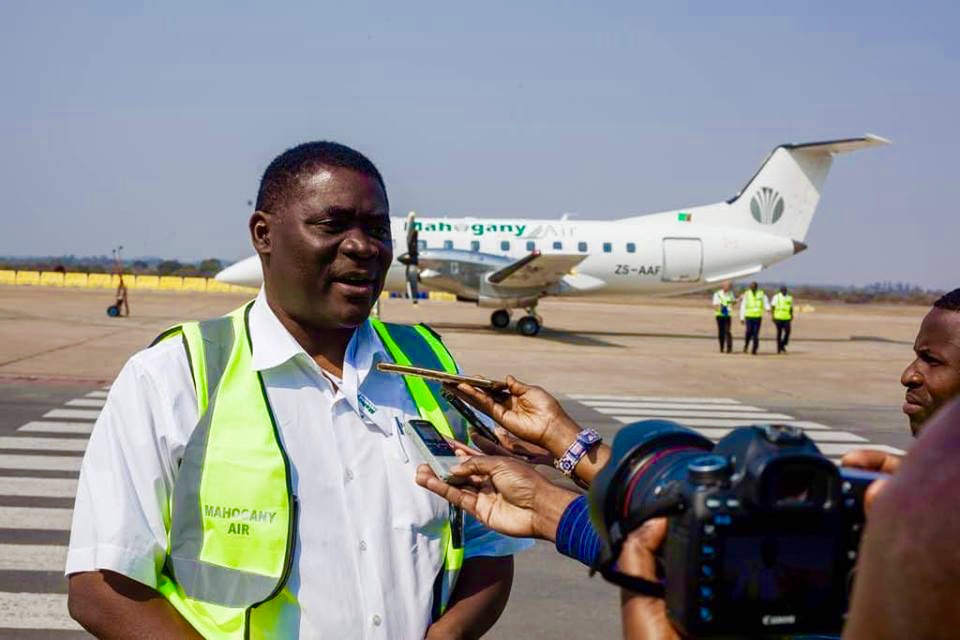Mahogany Air is a successful private airline in Zambia with a pedigree of excellence. It boasts of being the only airline that went under water once and later resurfaced for good, this time stronger. Behind this story is a man that has defied the odds, a veterinary surgeon and molecular scientist by profession who goes by the name Dr. Jim Belemu. The Mahogany Chief Executive Officer, specialized in use of atomic energy in diagnostics and Deoxyribonucleic Acid (DNA) science having worked in International jurisdictions such as France, South Africa and Malaysia to mention but a few. During his stint at the United Nations (UN) wing – Food Agriculture Organization (FAO) he served as Head of Emergency Operations before serving as Consultant after which he was appointed Team Adviser to the Sudanese government for cash transfers which he did not take up but opted at this point to venture into the airline business in 2012.
Jim and his wife (Diana) ventured into an expensive plus cash intensive business and are not ashamed to admit they got it wrong in the beginning and as such their business plan needed more work which forced them to suspend operations in September 2014. They underestimated the business cash injection, cash flows and policy analysis. The suspension of operations that was initially meant to last a few months, extended to 3 years after which Mahogany was relaunched in 2017 after the Belemus re-strategized and spread their risk by engaging additional investors into the business model.
Mahogany Air derives it’s name from a hard wood resilient indigenous tree. The airline competes with the likes of Proflight Zambia offering similar services. Dr. Belemu strongly believes aviation should be driven by the private sector in a healthy competitive environment.
The visibly successful Mahogany CEO leverages off a Zambian population with disposable income and purchasing power to start flying through changing their mindsets by use of modern tools such as social media that deviates from the traditional bookings with travel agents. Mahogany is in touch with current trends and boasts of increasing domestic flights by 20% in 2018. Dr. Belemu’s strategy has been to focus on untapped routes especially ones attracting developmental projects.
Mahogany’s competitive strategies
The airline has focused on equipment (aircraft size) shying away from the 737 stereotype syndrome that states that if you don’t own a Boeing then you don’t run an airline. Dr. Belemu believes that it makes more business sense to increase flight frequency whose aircraft size is determined by traffic volumes aligned to needs i.e early flights for the corporates to midday and late afternoon schedules. As such Mahogany runs 3 flights on 30 seater aircrafts than bundling flyers in a Boeing 737.
The Mahogany CEO also emphasizes the need to understand the policy environment of the aviation industry. Policy in itself isn’t enough but the players should provide as much information to the policy makers of whatever difficulties are faced, incentives required and general cost structure. Mahogany has to date been granted 50% of the incentives asked for. Dr. Belemu is very lucky to have a spouse who is well specialized in policy analysis that has played a very pivotal role in managing this faculty for the airline.
Bilateral service agreements are another important took that the airline has thrived on despite the need to relax restrictions to suit needs of clients in a changing business environment. Instead of the airlines dictating when to fly given routes, clients needs should set the tone of how flexible airlines should fly.
Collaborations are very lucrative and key for business continuity and working together. “When tourists come to Africa on Boeing’s, they don’t come to cities but need to get to areas where we fly, so we will provide the same luxury they get on the Boeing but this time on a smaller plane,” Dr. Belemu said in a podcast. For as long as we meet the security and safety conditions, the bigger airlines should encourage us by feeding us with passengers. We have maintained reliability and high maintenance standards through agreements from South Africa.
How Mahogany CEO feels about Zambia Airways relaunch
Dr. Belemu believes in a collaborative and symbiotic model with Zambia Airways. “National Airlines have bad reputation of failing but we do believe the authorities revisited their past failures, mistakes so as not to fall into disrepute,” the CEO said. We don’t know what model they wish to take but whatever the case it will be better to work together than disrupt operations, he said.
Zambia Airways was last reported at Air Operators Certificate – AOC stage but the market is not privy to what stage the process is at currently.
The article has been written with reference to the podcast run by Jon Howell Founder and Managing Director of AviaDiv Africa, Africa’s premier event dedicated to developing air connectivity.

